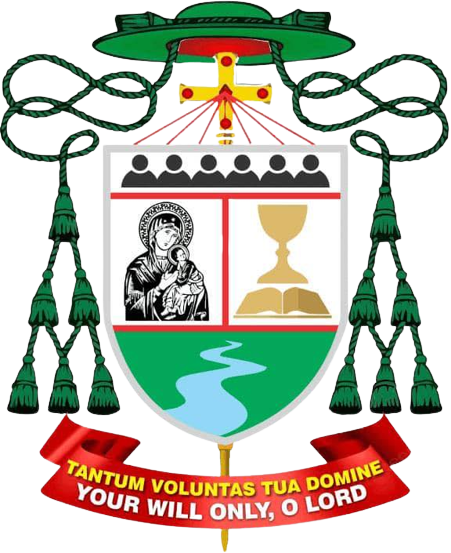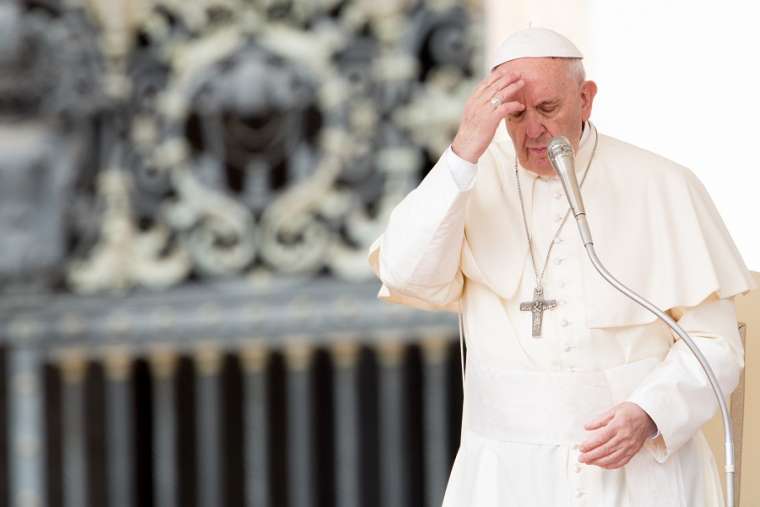There are “three fundamental steps on the journey of faith: to listen, to be a neighbor, to bear witness,” Pope Francis said in his homily at the closing Mass for the synod on young people in St. Peter’s Basilica on Oct. 28.
He delivered his challenging homily about “the journey of faith,” as he concelebrated mass with the 260 synod fathers from more than 130 countries. Also in attendance at Mass were the 36 young people from all continents who had actively participated in this historic event, and who processed into the basilica in front of the priests, bishops, cardinals and pope. During the Mass the young people read the first two scripture readings in English and Italian, and later read prayers in Hindi, Spanish, Polish, Portuguese and Chinese.
Synod final document warns against ‘pre-packaged answers,’ urges ‘accompaniment’ and endorses women in church leadership Francis Pope Francis concludes synod by condemning ‘the continuous accusations to smear the church.’
Commenting on the story from the Gospel of St. Mark about the blind, beggar man, Bartimaeus, who called out to Jesus as he walked on the road from Jericho to Jerusalem, the pope recalled that after Jesus stopped, listened to what he had to say and gave him back his sight, the man became a disciple and walked with him and the other disciples to the holy city.
“We, too, have walked alongside one another; we have been a ‘synod’,” he told them, before offering roadmap for their future lives.
Pointing to how Jesus took time to stop and listen to the blind man, Francis said “the first step in helping the journey of faith” is “listening.” It is “the apostolate of the ear: listening before speaking.” He recalled that many of those with Jesus “ordered Bartimaeus to be quiet,” they considered this “person in need” a mere “nuisance, unexpected and unplanned. They preferred their own timetable above that of the Master, their own talking over listening to others. They were following Jesus, but they had their own plans in mind.” Francis said “the first step in helping the journey of faith” is “listening.”
Francis warned today’s followers of Jesus that “this is a risk constantly to guard against,” and reminded them that “for Jesus, the cry of those pleading for help is not a nuisance but a challenge.” He reminded them that God always listens to us: “God never grows tired; he is always happy when we seek him.”
Then, looking at the young people seated in front of him, Francis asked them “in the name of all of us adults: forgive us if often we have not listened to you, if, instead of opening our hearts, we have filled your ears.” He assured them, “as Christ’s Church, we want to listen to you with love, certain of two things: that your lives are precious in God’s eyes, because God is young and loves young people, and that your lives are precious in our eyes too, and indeed necessary for moving forward.”
He then went on to explain that “a second step on the journey of faith is to be a neighbor.” He recalled how in the Gospel story Jesus “goes personally” to meet the blind beggar, “he does not delegate someone else” to do so.
“That is how God operates. He gets personally involved with preferential love for every person. By his actions, he already communicates his message,” Francis said. Francis warned that “when faith is concerned purely with doctrinal formulae, it risks speaking only to the head without touching the heart.”
Francis warned that “when faith is concerned purely with doctrinal formulae, it risks speaking only to the head without touching the heart. And when it is concerned with activity alone, it risks turning into mere moralizing and social work.”
The Jesuit pope explained that “faith, instead, is life: it is living in the love of God who has changed our lives.” He told the bishops and young people, “We cannot choose between doctrine and activism. We are called to carry out God’s work in God’s own way: in closeness, by cleaving to him, in communion with one another, alongside our brothers and sisters.” He emphasized that “closeness” is “the secret to communicating the heart of the faith.”
Moreover, he said, “being a neighbor means bringing the newness of God into the lives of our brothers and sisters” and “serves as an antidote to the temptation of easy answers and fast fixes.” Being a neighbor means rejecting “the temptation to wash our hands,” he said; it means “to imitate Jesus and, like him, to dirty our hands.” Francis reminded them, “Jesus became my neighbor: it all starts from there. And when, out of love of him, we too become neighbors, we become bringers of new life” and “witnesses of the love that saves.”
“Being a neighbor means bringing the newness of God into the lives of our brothers and sisters.” Pope Francis spoke next about the third step on the journey of faith: “to bear witness.” Drawing again on the Gospel story, he recalled how Jesus sent his disciples to the blind, beggar man, “not with a coin to shut him up, or to dispense advice,” but just to tell him: “Take heart; get up, he is calling you.” Jesus “heals in spirit and body,” the pope said, “Jesus alone calls, transforming the lives of those who follow him, helping raise up the fallen, bringing God’s light to the darkness of life.”
Pope Francis reminded the bishops and young people that in today’s world “so many children, so many young people, like Bartimaeus, are looking for light in their lives. They are looking for true love. And like Bartimaeus who in the midst of that large crowd called out to Jesus alone, they too seek life, but often find only empty promises and few people who really care.”
He told them, and the whole community of believers, that “it is not Christian to expect that our brothers and sisters who are seekers should have to knock on our doors; we ought to go out to them, bringing not ourselves but Jesus. He sends us, like those disciples, to encourage others and to raise them up in his name. He sends us forth to say to each person: ‘God is asking you to let yourself be loved by him.’”
“How often, instead of this liberating message of salvation, have we brought ourselves, our own ‘recipes’ and ‘labels’ into the Church!” Pope Francis remarked, “how often, instead of this liberating message of salvation, have we brought ourselves, our own ‘recipes’ and ‘labels’ into the Church! How often, instead of making the Lord’s words our own, have we peddled our own ideas as his word!”
He added, “How often do people feel the weight of our institutions more than the friendly presence of Jesus! In these cases, we act more like an NGO, a state-controlled agency, and not the community of the saved who dwell in the joy of the Lord.”
He concluded his homily by recalling that “the journey of faith” expressed in those three fundamental steps in today’s Gospel, ends in a beautiful and surprising way when Jesus says, “Go; your faith has made you well.” Francis drew attention to the fact that “Bartimaeus had made no profession of faith or done any good work; he had only begged for mercy,” and said, “to feel oneself in need of salvation is the beginning of faith. It is the direct path to encountering Jesus.”
He explained that “the faith that saved Bartimaeus did not have to do with his having clear ideas about God, but in his seeking him and longing to encounter him.” Francis emphasized that “faith has to do with encounter, not theory. In encounter, Jesus passes by; in encounter, the heart of the Church beats. Then, not our preaching, but our witness of life will prove effective.”
Pope Francis prayed that the Lord may “bless our steps, so that we can listen to young people.” He concluded by thanking all those who had participated in the synod for their “witness” and for having “worked in communion, with frankness and the desire to serve God’s people.” He prayed that the Lord may “bless our steps, so that we can listen to young people, be their neighbors, and bear witness before them to Jesus, the joy of our lives.”
At the end of Mass, the Secretary general of the synod, Cardinal Lorenzo Baldisseri, read “A letter from the synod fathers to young people.”
Later, at the angelus, Pope Francis, after recalling that today is the 60th anniversary of the election of Pope John XXIII, spoke again about the synod of young people.
He described it as “a good grape harvest,” which is already fermenting and “promises good wine,” and then emphasized that “the first fruit” of this synod is to be found, not in the final document, but “in the example of a method” that “we tried to follow, starting from the preparatory phase.” He explained that this “synodal style” does not have as its primary objective the drafting of a document which, of course, “is surely precious and useful.” Rather, he said, “even more than the [final] document” it “is important is to spread” throughout the church “a way of being and working together, young people and elders, in listening and discernment, to come up with pastoral choices that respond to reality.”
Pope Francis made clear that he wants the method of listening, discerning and reaching conclusions that was used in the synod on young people to be extended and made operative throughout the Catholic church, thereby building “a synodal church.”

